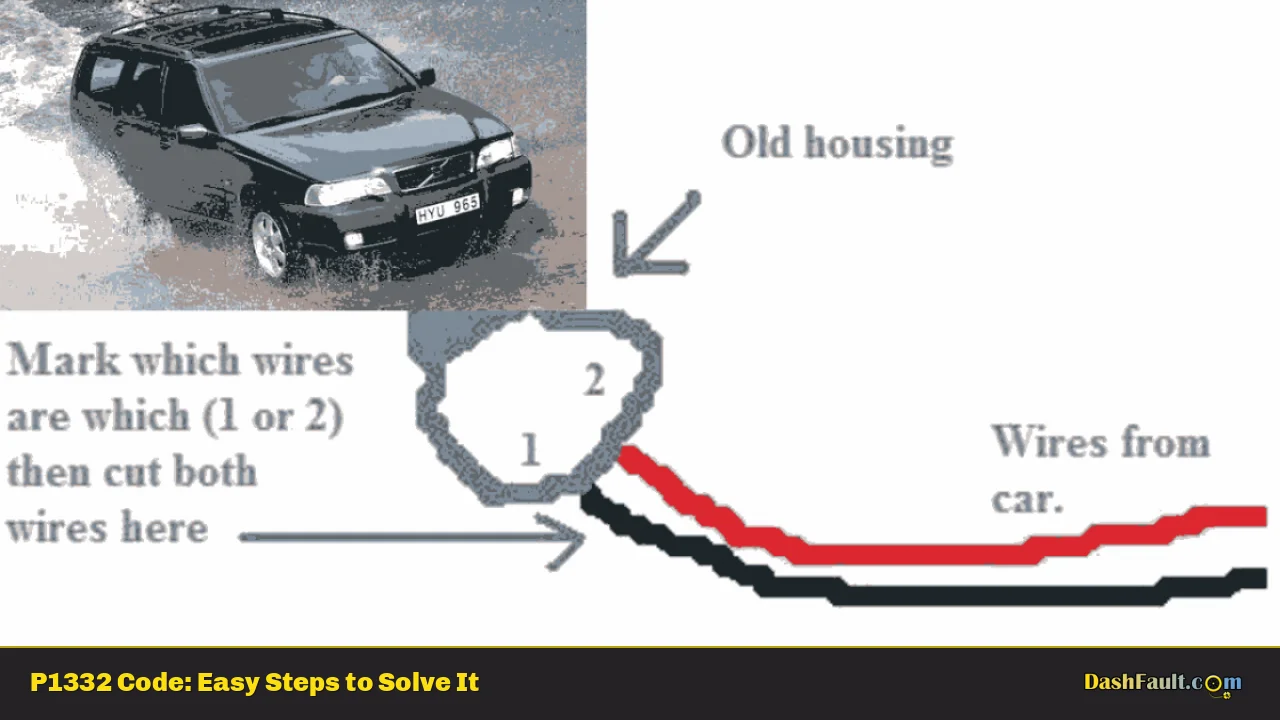The P1332 trouble code is a diagnostic trouble code (DTC) that indicates a problem with the engine’s knock sensor, specifically “Knock Sensor 4 Low Input.” This code is crucial for maintaining optimal engine performance, as the knock sensor plays a vital role in detecting engine knocking or pinging, which can lead to severe engine damage if not addressed. When the Engine Control Module (ECM) detects that the input signal from Knock Sensor 4 is lower than expected, it triggers this code, alerting the driver to potential issues that need attention.
| P1332 Code Meaning | P1332 Code Common Causes |
|---|---|
| Knock Sensor 4 Low Input | Faulty knock sensor |
| Engine performance degradation | Wiring issues or corrosion |
| Increased fuel consumption | Faulty ECM or incorrect calibration |
| Potential engine knocking or pinging | Mechanical issues affecting sensor operation |
Symptoms of P1332 Code
Understanding the symptoms associated with the P1332 code can help vehicle owners and DIY mechanics identify issues early. Common symptoms include:
- Check Engine Light: The most immediate indication is the illumination of the check engine light on the dashboard.
- Poor Engine Performance: Drivers may experience reduced power, acceleration, and overall engine responsiveness.
- Increased Fuel Consumption: A malfunctioning knock sensor can lead to an overly rich fuel mixture, causing higher fuel usage.
- Engine Knocking or Pinging: Without accurate feedback from the knock sensor, the engine may produce knocking or pinging sounds, indicating potential damage.
Technical Explanation of P1332 Code
The P1332 code specifically refers to a low input signal from Knock Sensor 4. Knock sensors are piezoelectric devices that detect vibrations caused by knocking in the engine. This information is crucial for the ECM to adjust ignition timing and maintain optimal performance. When the ECM receives a low voltage signal from the knock sensor, it interprets this as a malfunction, leading to the P1332 code.
Step-by-Step Diagnosis
Diagnosing a P1332 code involves several steps:
- Initial Scan: Use an OBD-II scanner to confirm the presence of DTC P1332 and check for any additional codes that may be related.
- Visual Inspection: Inspect the wiring and connectors associated with Knock Sensor 4 for any signs of damage, corrosion, or disconnection.
- Sensor Voltage Check: With a multimeter, measure the voltage at the knock sensor connector. Compare your readings with manufacturer specifications.
- Sensor Resistance Test: Disconnect Knock Sensor 4 and measure its resistance with a multimeter to ensure it falls within specified ranges.
- ECM Connections Check: Inspect connections at the ECM for any loose or corroded pins that could affect signal transmission.
- Listen for Engine Noise: Pay attention to any unusual noises from the engine that could indicate false readings from the knock sensor.
Solution Methods
Resolving a P1332 code typically involves one or more of the following actions:
- Replace Knock Sensor: If tests indicate that Knock Sensor 4 is faulty, replacing it is often necessary.
- Repair Wiring Issues: If damaged wiring or connectors are found during inspection, repair or replacement may be required.
- ECM Reprogramming or Replacement: In cases where the ECM is determined to be faulty or improperly calibrated, reprogramming or replacement might be necessary.
Cost Estimates
The cost of repairs associated with a P1332 code can vary significantly based on location and vehicle type:
- Knock Sensor Replacement: $100 – $300 (parts and labor)
- Wiring Repairs: $50 – $200 depending on extent of damage
- ECM Reprogramming/Replacement: $200 – $1,000 depending on vehicle make and model
Warnings and Recommendations
- Immediate Attention Required: Ignoring a P1332 code can lead to severe engine damage due to improper ignition timing and potential knocking.
- Professional Help Recommended: If you are not comfortable performing these diagnostics or repairs, seek assistance from a certified mechanic.
- Regular Maintenance: Regularly inspect your vehicle’s electrical systems and sensors as part of routine maintenance to prevent issues like P1332 from arising.
Closing Paragraph
The P1332 trouble code indicates a significant issue with your vehicle’s knock sensor system. Understanding its meaning, symptoms, and potential causes allows vehicle owners and DIY mechanics to take appropriate action. By following proper diagnostic procedures and addressing any identified issues promptly, you can maintain your vehicle’s performance and prevent further complications down the line.
Frequently Asked Questions About P1332
- What does the P1332 code mean?
The P1332 code indicates a low input signal from Knock Sensor 4, which affects engine performance. - How serious is a P1332 code?
A P1332 code is considered moderate in severity but should be addressed promptly to avoid engine damage. - Can I drive my car with a P1332 code?
It is not recommended to drive your car with this code as it can lead to further damage. - What are common causes of a P1332 code?
Common causes include a faulty knock sensor, wiring issues, or problems with the ECM. - How do I diagnose a P1332 code?
Diagnosis involves using an OBD-II scanner, inspecting wiring and connectors, and testing sensor voltage and resistance. - Is replacing a knock sensor difficult?
Replacing a knock sensor can be straightforward for those familiar with automotive repairs but may require professional help for others. - What happens if I ignore a P1332 code?
Ignoring this code can result in reduced engine performance and potential long-term damage. - Should I reset my check engine light after repairs?
Yes, after addressing the issue associated with the P1332 code, you should reset the check engine light using an OBD-II scanner.
